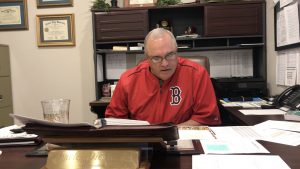The long-debated question of consolidating smaller school districts in Oklahoma to help the education budget has reappeared in the wake of the statewide teacher walkout.
A bill that would have consolidated smaller school districts died 11-1 in a Senate committee in February. There are 520 school districts in Oklahoma, and the bill aimed to group together districts with fewer than 200 people.
Proponents of district consolidation argue that less districts in Oklahoma lessens administrative costs, such as reducing the amount of superintendents – whose consolidated salaries would provide more money for education.
However, Charles Dickinson, superintendent at Dale Public Schools, said consolidating districts would barely create more money for education.
“Financially, there is no great help to the state of Oklahoma in consolidating schools,” Dickinson said.
Dickinson said the money that would go to the education budget as a result of consolidating districts would be minimal and barely move Oklahoma in education rankings.
Dale Public Schools, a small school district made up of one elementary, one middle and one high school, totals 820 students from pre-K through 12th grade.
Dickinson said in addition to the minor budget increase that would result from district consolidation, DPS serves as a key employer for the small town of Dale, Oklahoma.
“You go to different parts of Oklahoma … if the school went away and got consolidated with someone else, the town dies,” Dickinson said.
Dickinson said he went to Oklahoma Capitol to speak to his representatives, along with the thousands who have been rallying for increased education funding since April 2.
Dickinson said that his priorities are to “decrease class size along with adding electives to our middle school and high school curriculum.”
Even though DPS needs more funding to accomplish those goals, Dickinson said consolidating districts is not a viable option.
“Just don’t think consolidation is the answer in Oklahoma,” Dickinson said. “Could it help some kids in certain parts of the state? Probably. For the most part, it’ll kill the little towns, and it doesn’t save the state any money.”

